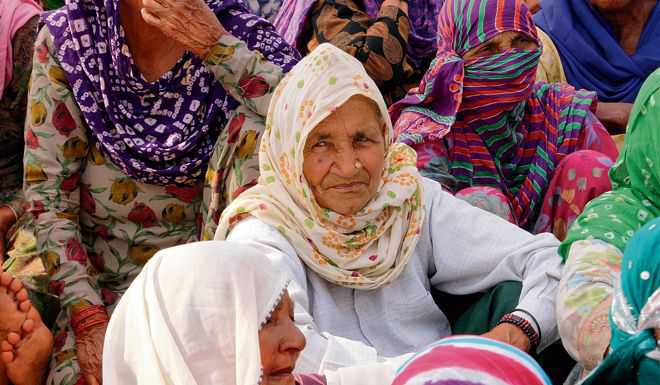
Daunting: When frail and living alone, it is difficult for the elderly to access healthcare.
Rajesh Gill
Professor, Department of Sociology, Panjab University
According to the State of World Population 2019 report recently released by the United Nations Population Fund, currently 6 per cent of the total population in India comprises the elderly, i.e. 60-plus persons. It has projected that the proportion is likely to increase to 20 per cent by 2050. This calls for a serious discussion to initiate a process of social reconstruction, since only policies are not going to bear fruit. A recent incident at Chandigarh, wherein an elderly couple was found dead — the man had slit his wife’s throat before killing himself — indicates the dismal situation that is likely to aggravate.
It has been observed that the wellbeing and care of the elderly population, especially in India, is more of a social than a legal or administrative issue, primarily for the following reasons:
One, unlike the West, our society has had a tradition of placing primacy upon the ‘parent-child’ unit within the family, instead of the ‘spousal’ relationship. Therefore, parents invest enormously in their children, both financially and socially/psychologically, with an expectation that they would be looked after by them in their old age.
Secondly, the parent-child relationship is considered a private affair, and even in cases of extreme harassment by one's children, parents find it socially unacceptable to take the legal recourse. That is why the number of cases filed by parents against children under the Maintenance and Welfare of Parents and Senior Citizens Act, 2007, is extremely low. Average parents keep on bearing the indifference and even misbehaviour of their children silently to avoid the social stigma. Many elderly couples boast of how well they are taken care of by their children since that serves as a status symbol. That is why, barring a section among the urban upper middle classes, it is considered a social stigma to move to an old age home while children are around.
Another reason is the absence of any social security system, which often makes the family the only support system in old age. It is a daunting task for the elderly persons, especially when frail and unwell, and when they are living alone, to access the healthcare system, despite various concessions and facilities made available to them. The problem is more severe for the elderly women due to their greater dependence — financial, physical and social — and they generally have little access to health and other services available to senior citizens. In a recent research study conducted by me in Punjab and Haryana, elderly women were found to be incapable of moving to the bank to get their old-age pension due to their physical immobility and dependence upon the younger members in the family, who often took a large chunk of the money in return for the favour of taking them to the bank.
Last, but probably the most relevant factor that aggravates the problems of elderly, is their over-indulgence in children, so much so that once the children leave for greener pastures, parents are left with no purpose in life, no hobbies, no life without children. They keep waiting for telephone calls from the children, who are miles apart, busy in their own lives, and, as a result, a large proportion among them ends up with depression and isolation. A number of studies conducted on the elderly in India have indicated that more than 30 per cent of the elderly suffer from fear of fall (FoF) and, thus, are physically and mentally vulnerable. Studies also confirm a higher incidence of verbal abuse among the elderly by their young relatives.
In the absence of any social security system, the elderly primarily depend upon their family members, whether living with them or away. However, this expectation from the younger generation is proving to be a farce as parents are no longer preparing their children as care-givers, and hence the contradiction. The family today makes a huge investment, financially, psychologically and socially, both for sons and daughters in order to ensure a good career for them, providing them with comforts. Unlike our generation, wherein children were made to participate in the household and social activities, the children today are ‘not disturbed’ and are encouraged to enjoy their ‘privacy’ till they complete their education and adopt a career. While parents pamper the children, the market and media join in injecting a kind of individualism with a high dose of indulgence towards self-pampering. Consumerism thrives on this new-found sense of ‘freedom’, howsoever pseudo it might be, resulting in a generation that has never been trained to ‘give care’ by sacrificing their own comfort, career or ambitions.
It would, however, be inappropriate to blame our young children because the onus lies on us as their parents and teachers. We define ‘success’ for them; we train them to always be ‘ahead’ of others; we send them away so that they can earn status, money and success for themselves and for us. We forget that they would not be in a position to return when we need them. It is not possible to ‘eat the cake and have it too’.
The social isolation and depression among the elderly need to be handled with a two-pronged strategy:
One, the spousal unit has to be prioritised so that even after children are gone, one ‘enjoys’ life being together. It is fascinating to watch elderly couples in the West, travelling, drinking, moving around together and enjoying life. Why is it that our sense of humour gets wiped out as we grow old? After all, why should it be considered a sin, particularly for the elderly women, to be enjoying their hard-earned freedom after having completed their family responsibilities?
Secondly, our children must be trained to be ‘care-givers’ so that like their parents and grandparents, they too are capable of keeping a balance between their own life and that of their elderly parents, ready to sacrifice a bit of their ‘success’, ‘time’ and ‘affection’.
Rather than letting the media and market teach them, our children must receive the first lessons of ‘individualism’ and ‘freedom’ from us — parents and teachers — so that they understand how self-destructive ‘privacy’ can be in the long run.



























